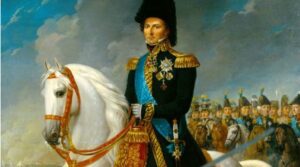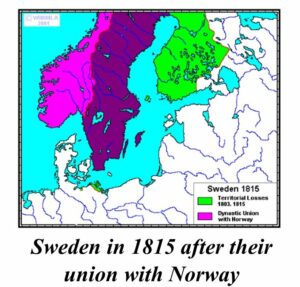
Would you believe that Sweden hasn’t been in a war since1818?
This is an amazing story, which I think this is due to the Napoleonic wars.
Background
In February 1808, Russia occupied Finland, while at the same time the Swedish King, Gustav III, refused to block British trade in the Baltic. This led to a coup that forced King Gustav to abdicate in favour of his uncle, King Karl XIII who become King. This was not a good solution as he was chronically ill and, yes, childless, he had no descendants! The result was that they found a Danish prince, Christian August of Augustenborg, and named him the heir.
But he quickly died! Now Sweden needed another heir!
What happened next?
Something weird happened. A member of the Swedish Parliament then proposed Jean Bernadotte, one of Napoleon’s Marshalls.
Who, you ask, which is what parliament also asked!
Now this is the interesting bit. He was a French Catholic, who after joining up at 17, had climbed the ranks to eventually be appointed a Marshall of France by Napoleon. Then he married Napoleon’s former fiancée, Désirée Clary, whose sister was married to Napoleon’s brother, Joseph. He couldn’t have been closer to Napoleon.
Initially the Swedish Parliament thought the idea mad, while Napoleon thought it bizarre. However, Marshal Bernadotte was well known and popular in Sweden, due to his time as governor of both the Hanseatic cities and Hanover, where he had shown extreme kindness to Swedish prisoners.
Eventually, in 1810 the Swedish Parliament decided to accept him, hoping he would protect them from France’s ambitions.
What was the effect of this decision?
Now, he was a very realistic man and he believed Napoleon’s days were numbered, so he accepted the Swedish Parliament’s request to be the heir. He moved to Sweden, but his wife didn’t, she didn’t fancy leaving her life and friends in Paris!
The King adopted him as his son, he took the name, Karl Johan, and due to the King’s ill health, he basically ran the country.
Did he back France?
No, once there he allied Sweden with Russia and Great Britain. This did not impress Napoleon who responded by occupying Swedish territory in northern Germany and Poland. This meant that Bernadotte, now Karl Johan, led Swedish troops against the French army, and in October 1813, he won several battles!
Union with Norway
 At this time Norway was in a union with Denmark, but the newly named Karl Johan felt it should be part of Sweden. Therefore, he set about persuading Denmark to concede Norway to Sweden.
At this time Norway was in a union with Denmark, but the newly named Karl Johan felt it should be part of Sweden. Therefore, he set about persuading Denmark to concede Norway to Sweden.
He achieved this; however, the Norwegians didn’t like it, so declared themselves independent. Now, he was a very special guy, he negotiated, he was good, as in the end they agreed on two kingdoms with one King, him!
Then in 1818 the old King finally died; Bernadotte now became King Karl XIV Johan. Once King, he announced Sweden’s policy of neutrality, it worked and has kept Sweden out of wars ever since.
Why?
I think that as a soldier he had seen the horrors of war and decided that with a strong army he could move Sweden to neutrality, which he did.
What an amazing man? A Catholic Frenchman, without noble blood, who became the King of not one but two Protestant countries, Sweden and Norway!
That neutral policy remained for 208 years until Russia invaded Ukrain, however, the point to remember is that all along they have kept a strong well-equipped army.
Isn’t History Interesting?
10 questions to discuss:
- Explain the historical context leading to Sweden’s involvement in the Napoleonic Wars and its subsequent need for a new heir.
- Compare and contrast the initial reactions of the Swedish Parliament and Napoleon to Jean Bernadotte’s candidacy.
- Analyze the motivations of Jean Bernadotte in accepting the Swedish crown and his subsequent shift in alliances against Napoleon.
- Evaluate the role of military strength and strategic alliances in securing Sweden’s neutrality after 1818.
- Explore the challenges and potential contradictions inherent in maintaining a policy of neutrality amidst changing global power dynamics.
- Compare Sweden’s historical approach to neutrality with that of other countries, such as Switzerland or Costa Rica.
- Discuss the economic, social, and political benefits and drawbacks of a long-standing policy of neutrality for Sweden.
- Imagine you are a Swedish citizen during the reign of King Karl XIV Johan. What are your views on his rule and Sweden’s neutrality?
- Reflect on the enduring legacy of Jean Bernadotte’s leadership and his contribution to shaping Sweden’s peaceful foreign policy.
- In your opinion, is neutrality still a viable option for countries in the 21st century, considering the complex nature of global conflicts and alliances?
These questions go beyond summarizing the facts and encourage critical thinking, historical analysis, and personal reflection. They prompt you to consider the motivations of key figures, the impact of historical events, the pros and cons of neutrality, and its relevance in the modern world.
For more information on this please click:
https://en.wikipedia.org/wiki/Union_between_Sweden_and_Norway
https://www.royalcourt.no/artikkel.html?tid=30100&sek=27320
© Tony Dalton

